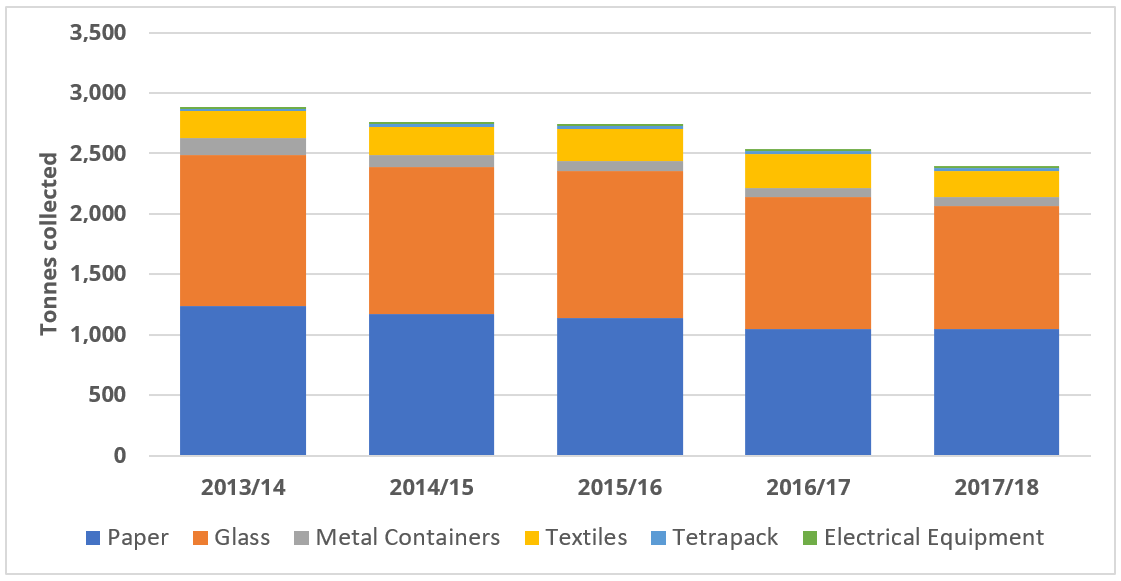Shropshire Council wants to close all its recycling bring banks across the county, including the six in Ludlow. The council says that usage has fallen and that people can use kerbside recycling. Usage has fallen but only by 17% over five years. Each bring bank collects more than 22 tonnes of recyclables every year. That’s around 6% of household dry recyclables collected by Veolia.
The council complains about contamination of recyclables and fly-tipping at bring banks but says it has no information on how often this happens.
People use bring banks for a reason. Those that live in apartments often don’t have anywhere to store the recyclables. Other households don’t have enough space to store the aftermath of a jolly good party. Some people will be going on holiday and want to ensure everything is in the system first.
The real reason that Shropshire Council wants to scrap bring banks is to save £230,000 a year.
Shropshire Council is consulting until 25 January on closing all the county’s recycling bring banks
It is not helpful for Shropshire Council to launch a consultation without publishing data on usage. Usage had declined in the last five years but the council’s press release gives the impression that the facilities are barely used. That is far from the case. Here is the trend over the last five years.

As you can see, the volume of recycling collected at the 107 bring banks has reduced but not by a huge amount. [1] The bring banks collect around 2,400 tonnes of dry recycling a year – that’s paper, glass, metal containers, textiles, tetrapack and small electrical equipment. This is 17% down on five years ago when around 2,000 tonnes were collected. But with each facility collecting of more than 22 tonnes of dry recycling a year on average, the bring banks are far from underused.
The main problem is the cost which runs to £230,000 a year. I have no idea whether this is a fair charge by Veolia but the council’s 27-year waste contract with the company has always looked on the pricey side. This contract is a legacy of the now discredited Public Finance Initiative.
The council complains that fly-tipping is occurring at bring banks. There is no doubt that some fly-tipping occurs but the only location the council has cited is Oswald Road in Oswestry. It is puzzling that fly-tipping should occur in Oswestry where the household recycling is open seven days a week.

The council does not have any information on the extent of fly-tipping. Any material left beside the containers on bring banks is cleared up by regular household recycling and refuse crews. I don’t think that can be expensive. Part of the so-called fly-tipping anyway is due to the bring banks filling up and not being emptied.
The council also complains some bins are being contaminated. I have no doubt that some loads will be contaminated but again the council has no data on the extent of contamination. The containers at bring banks are lifted onto wagons and taken to waste transfer station. There operatives make a judgement on the level of contamination and if it is too high, the material is dispatched for incineration. However, my gut feeling is that contamination cannot be very high. It doesn’t matter if someone puts a tin in bottle bank or plastic in a metal bank. Dry recyclables are mingled together before being taken to the Materials Recovery Facility at Four Ashes where they are separated. The biggest potential contaminant is paper or cardboard boxes.
The council says that closing the bring banks will improve county’s recycling rate, which fell last year. It has yet made the case for that assertion. It says that if it only collects from the kerbside and household recycling centres carbon emissions will be reduced. I accept there will be a reduction in vehicle miles driven. But if recycling rates continue to dip the county’s carbon emissions will rise. The council must look at the overall emissions picture.
If Shropshire Council goes ahead with this proposal, it will join a small band of councils that have closed their bring banks. However, most councils still recognise the contribution these small collection sites make to recycling rates.
The council will not introduce kerbside collection for clothing, which it says can go to charities. Small electrical equipment and Tetrapacks will have to be taken to the nearest household recycling centre. That’s a trip Craven Arms for us in Ludlow. It’s hardly carbon efficient to drive that far to recycle small loads. [2] More recyclables look destined for the black bin and incineration.
At the Shropshire Council meeting ten days ago, councillors unanimously agreed to give a greater priority to reducing carbon emissions and its impact on climate change. With introducing this proposal to remove bring banks, it seems to have forgotten that priority already.
I will be opposing closure of bring banks when the decision when it goes to Cabinet. Should the cabinet approve the move, I will endeavour to call the decision into scrutiny for re-examination. We must recycle and promote recycling in any way we can.
Notes
[1] Shropshire Council says that it operates 120 bring banks across the county but its website lists 107 sites. I have used 107 for the analysis in this article.
[2] And by the way, don’t try and go to Household recycling centres on foot. Pedestrians are barred and only vehicles are allowed on site. How climate friendly is that?


How can a Council agree to vote to become a greener one addressing climate change one day and shut recycling centres the next?
I suppose it’s because to a certain majority Party saving a bit of money ‘in these austerity driven times’ is more important than saving the planet.
This is outrageous. We need more incentives for people to recycle not less.
What kind of message does it send when a county proposes closing down recycling points?